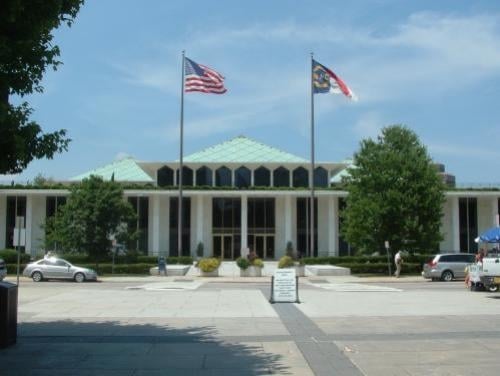You have /5 articles left.
Sign up for a free account or log in.

Study from Duke University finds a connection between legislators who attended public colleges and support for public higher ed.
North Carolina
It pays to have friends in high places -- and for public colleges and universities, it pays to have alumni in state legislatures.
A new study from Duke University’s Fuqua School of Business found a positive relationship between state funding levels for higher education and the share of legislators who attended the public colleges and universities in their states. In other words, legislatures where more lawmakers have ties to in-state colleges and universities provide more funding to those public institutions.
In fact, every legislator who has attended an in-state public college or university is associated with an additional $3.5 million in funding, according to the study’s authors.
Authors added that it’s not clear what, specifically, alumni legislators are doing to drive up funding. They could be lobbying fellow legislators. They could be voting on funding bills. They could be teaching universities about the best way to win state funding.
To reach their conclusion, the study’s authors analyzed data covering 96,010 legislators over the years from 2002 to 2014. Their findings don’t prove that adding a public-college graduate to a particular state assembly will directly cause a bump in public higher ed funding. But they clearly show a correlation between the number of legislators who were educated in public higher ed classrooms and funding for public colleges and universities.
The study also showed that the relationship was stronger in the six years after the Great Recession. And it was stronger among publicly educated legislators representing the districts in which their alma maters are located. Such legislators were likely not only supporting the institutions because they felt connected to them, but they were hearing from voters who support those institutions and the jobs they generate, said author Ryan C. McDevitt, an assistant professor of economics.
“Then you get the double whammy where they’re loyal to their school, plus they have their constituents,” McDevitt said.
Additionally, the study found that increases in the number of women representatives are associated with higher funding for state higher education. It found that the positive connection between funding and legislators who attended public institutions is stronger in states with smaller populations and smaller gross state products. And it found a stronger positive link between funding and legislators who attended public institutions in liberal states than in conservative states.
The findings are important at a time when state funding for higher education varies widely between states -- and after state funding for higher ed generally took a huge hit in the recession years.
“It’s a fascinating issue for two reasons,” said Aaron Chatterji, a report author who is an associate professor of business and public policy at Fuqua and Duke's Sanford School of Public Policy. “One, the funding in higher education at the state level has been such a hot-button policy issue. Two, as March Madness reminds us, there is such school spirit. People are almost irrationally attached to their schools.”
Personal experience matters as legislators make decisions, he said.
“While we can’t show that adding another University of North Carolina graduate to the North Carolina General Assembly is going to result in higher funding, it does make you question whether universities should be more actively encouraging their graduates to run for public office and advocate for public education if they believe that will benefit their lives,” Chatterji said.
The study also found major differences in legislators’ educational backgrounds between states and regions. The Midwest had the highest portion of legislators with ties to four-year institutions in their states, 77.4 percent. It was followed closely by the South at 74.8 percent and more distantly by the West at 59.3 percent and the Northeast at 58.8 percent.
The authors suggested future research into other political interests that could affect the connection between state funding and alumni legislators, such as their membership on committees or campaign contributions received.




